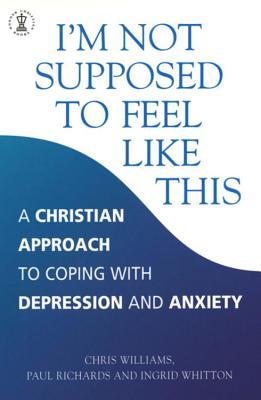I’m not supposed to feel like this
Paul Richards felt out of his depth in ministering to those with mental ill health during his early years as a Baptist minister. After developing his knowledge during a sabbatical, he co-authored a book documenting a Christian approach to overcoming depression and anxiety using Cognitive Behavioural Therapy principles.
I’m Not Supposed To Feel Like This continues to be widely used. Paul explains more

One of the most commonly asked questions among Baptist ministers seems to be “Why didn’t they tell us about this before we were ordained?” The four years I spent training for ministry were among the happiest of my life, and I regret not one day of them. But were I to write another book it would be called something like “I Wish They’d Told Me About That At College.”
The first chapter would without doubt cover the pastoral minefield of mental health issues. Two years in ministry and I was out of my depth, by year four I was floundering, and a year or so into my second pastorate I was drowning in a sea of ignorance, misinformation and pastoral ineptitude.
This prompted me to use my first sabbatical to learn about things like depression, anxiety, schizophrenia, psychosis, bi-polar disorder and a mass of other conditions - and also to discover that such simple classifications are generally counterproductive anyway. Time spent with Christian psychiatrists, chaplains specialising in mental health, and devouring a large pile of books helped. Working as an assistant chaplain in an acute psychiatric ward in a nearby hospital for a day a week was particularly valuable. It was probably the most useful three months I have ever spent since my ordination.
I returned from sabbatical having at least some idea of what I was doing, and particularly of what I shouldn’t be doing, to help the people I ministered to who experienced poor mental health. I felt at least tolerably competent, and if nothing else, able to avoid damaging vulnerable people by means of pastoral ministrations inflicted on the unsuspecting with all the sensitivity and subtlety of an elephant charge. I also came to lament the mixture of denial and quick-fix spiritual solutions that were the stock-in-trade, it seemed, of large swathes of church traditions and, at times, denominational leaders too.
At the start of my third pastorate I found a Consultant Psychiatrist, Chris Williams, in my congregation, and we soon became friends because of this common interest. Chris is one of the leading experts in CBT (Cognitive Behavioural Therapy) and was in the habit of inviting me to his seminars.
Over time I became something of a devotee of CBT; I love this approach because, while acknowledging the enervating and disabling effect of psychiatric conditions, it encourages people to believe that they can fight back against depression and anxiety, helping them to develop the tools to bring about change. I find this completely compatible with the Gospel with its message that transformation is possible with God’s help, while acknowledging that we have our part to play in the process.
 After one particularly stimulating seminar I casually remarked to Chris that it's a shame there isn't a book written primarily for Christians on overcoming depression and anxiety using CBT principles. This was really little more than a throwaway line, but Chris’ immediate response was “OK – let’s write one”, and so I’m Not Supposed to Feel Like This was born. A year later, having recruited the help of another Consultant Psychiatrist, it saw the light of day, and has been selling well ever since.
After one particularly stimulating seminar I casually remarked to Chris that it's a shame there isn't a book written primarily for Christians on overcoming depression and anxiety using CBT principles. This was really little more than a throwaway line, but Chris’ immediate response was “OK – let’s write one”, and so I’m Not Supposed to Feel Like This was born. A year later, having recruited the help of another Consultant Psychiatrist, it saw the light of day, and has been selling well ever since.
It is essentially a self-help book, with space to write answers and responses, and intersperses CBT principles with biblical material and general advice. It is especially helpful for people with a faith and with mild to moderate conditions.
Over the years since its publication it has had many reviews – mostly favourable – from many parts of the world. It is a really useful book to give to people who either suffer from these conditions, or are related to or trying to help those who are.
If it finds its way into your library, I hope and pray that you find it useful.
Paul Richards was born and brought up at Yardley Baptist Church in Birmingham. He entered training for ordained ministry in 1980 and has served churches in Dallas, Sudbury, Towcester, Leeds, Leicester. He is now pastor of Whitley Lodge Baptist Church in North Tyneside.
Do you have a view? Share your thoughts via our letters' page.
Baptist Times, 20/11/2018